 MyCatBreeds
MyCatBreeds Serengeti is originated from United States but Cornish Rex is originated from United Kingdom. Both Serengeti and Cornish Rex are having almost same weight. Serengeti may live 5 years less than Cornish Rex. Both Serengeti and Cornish Rex has same litter size. Both Serengeti and Cornish Rex requires Low maintenance.
Serengeti is originated from United States but Cornish Rex is originated from United Kingdom. Both Serengeti and Cornish Rex are having almost same weight. Serengeti may live 5 years less than Cornish Rex. Both Serengeti and Cornish Rex has same litter size. Both Serengeti and Cornish Rex requires Low maintenance.
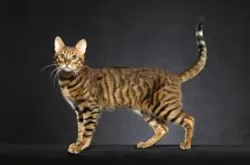 This is a cat breed that was deliberately bred to resemble the Serval cat. It was developed by crossing a Bengal cat and an Oriental Shorthair.
This is a cat breed that was deliberately bred to resemble the Serval cat. It was developed by crossing a Bengal cat and an Oriental Shorthair.
The cat was developed by biologist Karen Sausman in California in 1994. The breed is still under development.
The idea with this hybrid cat was to produce new domestic cat breed that would look like a wild cat but not have the wild characteristics.
The cat is recognized by TICA – The International Cat Association.
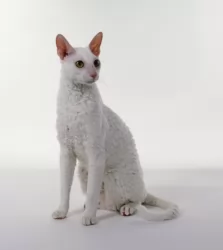 Cornwall is the birthplace of the unusual Cornish Rex cat – a curly-coated cat.
Cornwall is the birthplace of the unusual Cornish Rex cat – a curly-coated cat.
A kitten was born in 1950 and belonged to Nina Ennismore and Winifred Macalister. The other kittens had short hair but this unusual kitten had curly hair, the result of a spontaneous natural mutation.
A successful breeding program was started and it was in 1963 that the American Cat Fanciers Association as well as the and today it is recognized by all cat registries.
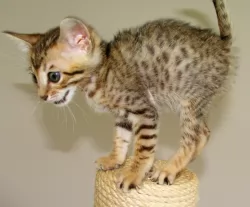 These are spotted cats with long legs and large, round-tipped ears. The neck is long and the body lithe, lean, and muscular.
These are spotted cats with long legs and large, round-tipped ears. The neck is long and the body lithe, lean, and muscular.
They are medium to large in size and can weigh up to 7 or 8kg. The coat is tan and cream with silver or grey coloring as well as black spots and stripes. Some Serengetis appear to be black but on closer look, you see that they have what is known as ‘ghost spotting’ – a black-spotted pattern that can scarcely be seen.
You may even think you are looking at a black panther. The coat is short, silky, smooth, and sleek. The eyes of the cat are round and are usually amber or gold.
The Serengeti is a friendly, social, and confident cat that is quite capable of forming a strong attachment to its human family. It is a loving, loyal cat. The cat can become bored and will need plenty of puzzle toys to keep his mind and body physically active.
You will need to provide him with a scratching post too as he is a lively, energetic cat. This isn’t only an indoor cat. Cats like the Serengeti will need an outdoor enclosure and the Serengeti cat will need branches and perches to leap up onto.
He is an active cat and can become bored if left indoors. They are capable of making a good family pet and are vocal too – telling you all sorts of things.
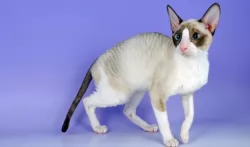 The Cornish Rex is a small to medium-sized cat weighing between 3 to 5kg. It’s a lithe, slender cat with a small, narrow head with big ears and eyes.
The Cornish Rex is a small to medium-sized cat weighing between 3 to 5kg. It’s a lithe, slender cat with a small, narrow head with big ears and eyes.
The cat has long, slender legs with a tail that is also slender and long. The hair is very fine and they are actually prone to hair loss. The coat has fine, short, silky hair. There can be a bit of a curl in the hair, The coat comes in many colors from white, silver, black, red, blue to chocolate and they can have different patterns too as well as bein bi-color.
The eyes can be gold, brown, or green. The torso is long and lean, the cat has a deep chest but strong hips and rear end that allow the Cornish Rex to leap with ease up onto perches.
The Cornish Rex loves his human family and loves spending time with them, whether that means fun and games or sitting in your lap.
He is intelligent and can learn a few tricks and is capable of learning to walk on a leash. He is a confident cat, playful and entertaining. Gentle and loving, he is a talkative cat, wanting to express his opinion about everything.
He will fit easily into different lifestyles, whether you’re single, a family, or in a retirement home, so long as he is receiving lots of attention.
He isn’t as frail as he looks and can get pretty active and social with children and dogs and may even beat the dog to fetching a small ball.
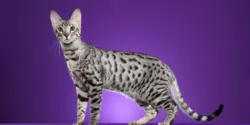 The Serengeti is both a friendly and affectionate cat even though he is a bit shy and overwhelmed in new surroundings.
The Serengeti is both a friendly and affectionate cat even though he is a bit shy and overwhelmed in new surroundings.
He is a cat that talks quite a bit and if he is happy and content he enjoys 'chatting' to you about his day.
He is able to get on well with children in the home as well as with other pets. He is an athletic cat and just loves to climb, and this is why he will certainly need an outdoor enclosure as he loves to dart around madly from time to time, and doing that in your home could be quite dangerous.
He is capable of being a loving cat breed and can form a strong bond with his human family.
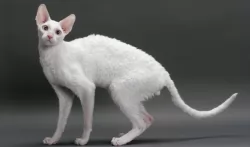 If you’re looking for a cat that can bring laughter and fun into the household, you won’t go wrong with a Cornish Rex as they will amuse and delight.
If you’re looking for a cat that can bring laughter and fun into the household, you won’t go wrong with a Cornish Rex as they will amuse and delight.
He is also a cat that doesn’t require a lot of fuss and bother, although he makes a fuss about the amount of attention he gets.
He doesn’t like being left alone for long, so a good idea is to work from home or to get a companion for him. Other than than, he makes the most splendid feline companion.
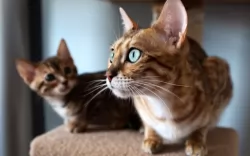 Hybrid Cats such as the Serengeti are a combination of a wild breed and a domestic breed. With good care he can live to be up to 15 years of age and possibly longer.
Hybrid Cats such as the Serengeti are a combination of a wild breed and a domestic breed. With good care he can live to be up to 15 years of age and possibly longer.
Hybrid cats are always controversial because people who have owned them have got both good and bad to say about them. They have some behavioral issues and many of them have an aggressive side, they’re aloof and they refuse to use a litter box. The cat can’t be blamed though because they have that wild side.
They also come with some health issues such as premature birth, miscarriage, diarrhea, and irritable bowel disease. You may just find yourself more often at the vet than you’d like.
You will need to ensure that your Serengeti gets all his vaccines and de-worming treatments.
 The Cornish Rex is a hardy cat with very few health issues. Certainly, because of the very fine hair, you’d have to be aware of sunburn.
The Cornish Rex is a hardy cat with very few health issues. Certainly, because of the very fine hair, you’d have to be aware of sunburn.
Cats can get sunburned and can be at serious risk of getting skin cancer later on. Be sun-smart and apply pet sunscreen.
Be careful of the type of sunscreen you use as your cat will likely want to lick it off. Other issues to look out for are hypertrophic cardiomyopathy. This is a common kind of heart disease in cats where there is a thickening in the wall of the heart.
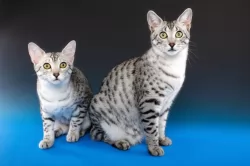 Grooming is easy for the Serengeti as it is a short-haired cat and will require a brush just once a week. Trimming the claws will also be necessary.
Grooming is easy for the Serengeti as it is a short-haired cat and will require a brush just once a week. Trimming the claws will also be necessary.
A cat such as the Serengeti has been developed by crossing the domestic cat with a wild breed. This means that there will be concerns with the temperament and behavior of these cats in a home setting. Apart from being allowed indoors, they will need an outside enclosure.
Having a wild side, while every cat is a carnivore, these cats are even more so. Their diet has to be strictly protein – meat. Wild cats would have a diet made up of birds and lizards. You want to avoid commercial cat foods that are of lower quality and have less meat in and more carbohydrates. This just spells ill health for your cat. Cats also need some fresh raw meat in their diets.
It is important to keep up your Serengeti's veterinary checkups to make sure there aren’t any health concerns.
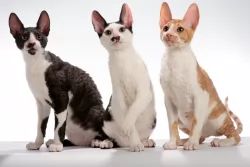 Grooming your Cornish Rex isn’t going to be an issue as the cat has very little hair. Although nothing is set in stone and some Cornish Rex’s have thicker coats, requiring more brushing. Maybe a soft brush once a week will be sufficient for this cat breed.
Grooming your Cornish Rex isn’t going to be an issue as the cat has very little hair. Although nothing is set in stone and some Cornish Rex’s have thicker coats, requiring more brushing. Maybe a soft brush once a week will be sufficient for this cat breed.
A good idea is to take a cloth of warm water and to gently wipe your cat so that he is free of dust.
Supply a litter box and make sure that you remove his droppings every single day.
Have your pet neutered or spayed if you don’t want unwanted kittens. These minor ops have many health benefits for your cat as well.
When you brush your cat, check his entire body out for any abnormalities. Check for new lumps, check inside the ears to make sure they are clean and free of redness which could indicate an infection.
Clip his toenails, make sure his eyes are clear and bright, free of discharge, and check inside his mouth to make sure there aren’t any bad teeth, as this could cause him a lot of discomfort.